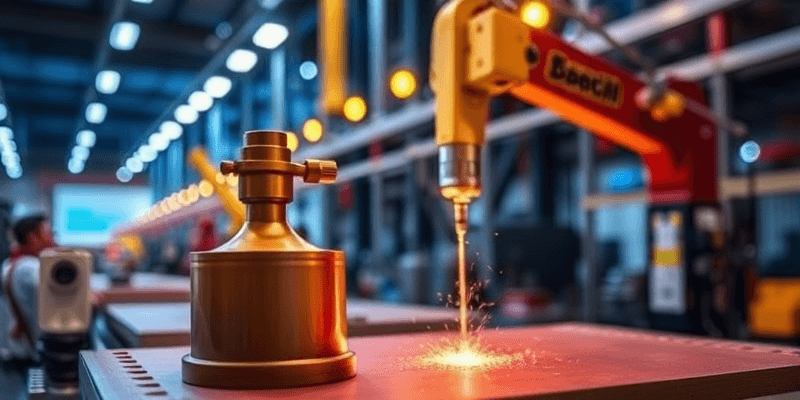Physical Address
304 North Cardinal St.
Dorchester Center, MA 02124
Physical Address
304 North Cardinal St.
Dorchester Center, MA 02124

Explore the emerging trends that are set to define the future of the manufacturing industry.
Manufacturing has long been a cornerstone of the global economy, driving innovation and providing essential goods to consumers. However, as we navigate through the 21st century, the landscape of manufacturing is undergoing a seismic shift. This transformation is propelled by emerging technologies, changing consumer demands, and an increasing focus on sustainability. In this article, we will explore the future of manufacturing by examining current industry trends and technologies reshaping the sector.
Smart manufacturing, often synonymous with Industry 4.0, integrates advanced technologies such as the Internet of Things (IoT), artificial intelligence (AI), and big data analytics into the manufacturing process. This approach aims to increase efficiency, reduce waste, and enhance customization. IoT devices enable real-time monitoring of machinery and production processes, allowing manufacturers to anticipate maintenance needs and prevent costly downtime. Additionally, AI algorithms can analyze vast amounts of data to optimize production schedules, improve quality control, and enhance supply chain logistics. As these technologies become more accessible, we can expect a broader adoption of smart manufacturing practices across various industries.
Another critical trend shaping the future of manufacturing is the increasing emphasis on sustainability. With climate change and resource depletion becoming pressing global issues, manufacturers are compelled to adopt more sustainable practices. The concept of the circular economy is gaining traction, encouraging businesses to rethink their manufacturing processes by designing for longevity, reusability, and recyclability. Innovations such as 3D printing are enabling manufacturers to create products with minimal waste and energy consumption. Furthermore, renewable energy sources are increasingly being integrated into manufacturing operations, reducing the carbon footprint of production. Companies prioritizing sustainability not only contribute positively to the environment but also enhance their brand value and appeal to eco-conscious consumers.
Consumers today are seeking personalized products tailored to their individual needs and preferences. This demand for customization is transforming manufacturing processes, pushing companies toward mass customization. Advanced technologies such as 3D printing and additive manufacturing are making it feasible to produce customized items at scale without sacrificing efficiency. Companies can leverage data analytics to understand consumer preferences better and adjust their production lines accordingly. As a result, manufacturers can offer personalized solutions while maintaining cost-effectiveness, creating a win-win scenario for both businesses and consumers.
The digital transformation of manufacturing also brings about significant changes to the workforce. As automation and AI technologies take center stage, the demand for skilled workers in new fields is rising. While some routine jobs may be displaced by machinery, new opportunities will arise in areas such as data analysis, robotics maintenance, and AI system management. Upskilling and reskilling programs will be essential to prepare the workforce for these changes. Manufacturers will need to invest in training initiatives, fostering a culture of lifelong learning to equip employees with the necessary skills to thrive in the evolving landscape. The future of manufacturing will be characterized by a collaborative relationship between humans and machines, enhancing overall productivity.
The COVID-19 pandemic has revealed vulnerabilities within global supply chains, prompting manufacturers to reevaluate their strategies. Future manufacturing will likely see a shift towards localization, reducing dependency on distant suppliers. Companies are beginning to prioritize resilience over efficiency, looking for ways to create more flexible and adaptable supply chains. Technologies such as blockchain are emerging as solutions to enhance transparency and traceability within supply chains, ensuring a more secure flow of goods. As manufacturers adopt these technologies, they will be better equipped to respond to disruptions and maintain continuity in their operations.
Several specific emerging technologies are poised to revolutionize manufacturing. Robotics, for example, has evolved significantly, with collaborative robots (cobots) working alongside human workers to enhance productivity and creativity. Moreover, advancements in materials science are leading to the development of smart materials that respond dynamically to environmental changes. McKinsey & Company provides insights into how these technologies can lead to innovative business models and processes.
Digital twins are another interesting development in manufacturing. A digital twin is a virtual representation of a physical object or system, allowing manufacturers to simulate and analyze performance in real time. This technology can facilitate predictive maintenance, design optimization, and operational efficiency. The synergy of IoT, artificial intelligence, and digital twins represents a transformative trend in how products are designed, produced, and maintained.
The future of manufacturing is poised for remarkable transformations driven by technological advancements, sustainability initiatives, and shifting consumer behaviors. As smart manufacturing becomes mainstream and the emphasis on customization grows, companies must adapt to remain competitive. Furthermore, investing in workforce development and reevaluating supply chain strategies will be essential to navigating the challenges and opportunities ahead. As manufacturers embrace these changes, they will not only enhance productivity but also contribute to a more sustainable and resilient global economy.